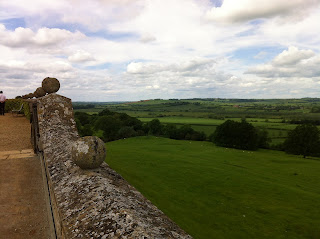Another busy weekend for me in which I told at the all new Festival of Arts & Literature for the Children of Norfolk and also two castles!
The first marked a return to Arundel Castle and because of the foul wind and weather I was lucky enough to be telling inside - In perhaps the most unusual space I've told in in a long time!
I was telling in this beautiful vaulted room (A vestibule even!) where I was surrounded by ancient weapons and many a stuffed and mounted deer's head looking down with dead eyes, so it was hard to tell if they liked my tales or not! It was a room just off this long hallway...
Also a space packed full of stuffed animals including some very rare American Eagle Owls that were bred on the estate long ago. What you are looking at here though is not the original castle, rather it is a nineteenth century rebuild, but beautifully done using ancient techniques and i'm sure that are many who walk along this passageway think they are walking along a 900 year old room. It does contain some fragments of the original castle keep though, including a medieval doorway that leads into the remains of the early undercroft.
From Arundel I came back to Norfolk for the Children's Festival before heading off to Rockingham Castle, in the midlands. It was unusually for this year a lovely sunny day when I arrived. There is not much of the early castle still standing except for the medieval drum towers and gate through which I passed to set up my tent in the inner courtyard. Another beautiful space surrounded by what looked to me to be Tudor and /or Jacobean buildings. It is a serene space even when full of people and the views over the low
walls provide stunning views for miles around. I was told by one member
of staff that you can actually see five counties!
Views from the inner courtyard wall
 |
| In the inner courtyard |
What stood out though at Rockingham was the clever use of modern day news reports on a video presentation in one of the drum towers. The presentation went from the news reader in the studio to a reporter reporting live at important events from the castles history, including the two civil wars of the 12th and 17th centuries. The reporter interviewed both important figures and everyday soldiers at each siege thereby giving a very unique and local spin on national events. It really kept me hooked and other sites that fixate on dates and building chronologies should take note!
Thanks to Andrew Norman for the Invite to Rockinham and also to his very warm and friendly staff.






You get to tell in some great places Dave ... I like the sound of the interviews from long ago ... i can just see our friend Jim Kavanagh in the role of irreverent reporter .. I can't help wondering if the interviewees in the 12th century (gosh, I don't know, Stephen and Matilda?) have French accents? In fact did the Normans have French accents ... how would we know?
ReplyDeleteNow there's a good question Liam. Perhaps they had dodgy Irish ones like our friend Jim!
ReplyDeleteBut yer royals wouldn't so much have spoken English with French accents as not spoken English at all. When would they ever have needed to speak to an English speaker? And if they had to do with someone who couldn't manage the French, there was always Latin. (I wonder what language Matilda had in common with her first husband, the Emperor?)
ReplyDeleteNot sure if there are any Norman speakers left in France. There are still speakers of Jersier - the language of Jersey - which must be close. The Jersey islanders claim England belongs to them, rather than vice versa, as it's the last fragment of the Duchy of Normandy, and was Norman well before our Conquest.
You can make a guess at how Normans spoke their French because spelling was not yet fixed by the invention of printing. When people just write what they hear, a letter which disappears from the written form is likely to be a letter that isn't sounded. We know that the Normans pronounced the s's which have since disappeared into circumflexes in modern French - so la forest instead of la foret - gu's were pronounced w (so guerre was 'war' and gardien (modern French) = guardien (old French) = pronounced warden, and Guilliame = William. They probably pronounced more of their consonants than the French do. They used z (the letter and probably the sound) more than modern French, which really only uses it for loan words. So raser (Modern French) was razer (Norman French) = to shave, gives us razor. They may even have pronounced the final s in plurals.
So a lot of the things we think of as 'typical French accent' would not apply. A French person hearing Matilda speak French might think of her as having an English accent.
What's odd is how quickly the Scandinavians who became Normans lost their Danish. It took a couple of hundred years for the Normans in England to lose their Norman French (Chaucer makes jokes about this 300 years later), but Rollo's men lost it in a couple of generations. I suspect it means they brought no Viking women with them (they were a war horde rather than an invasion of settlers), so their children grew up speaking the 'mother tongue'.
Woodness wracious me!
DeleteStand corrected Mr. storyteller ;-)
...
DeleteThank you for your remarkably detailed answer Sarah, although I like the idea that the Normans spoke with an 'allo allo' accent
ReplyDelete